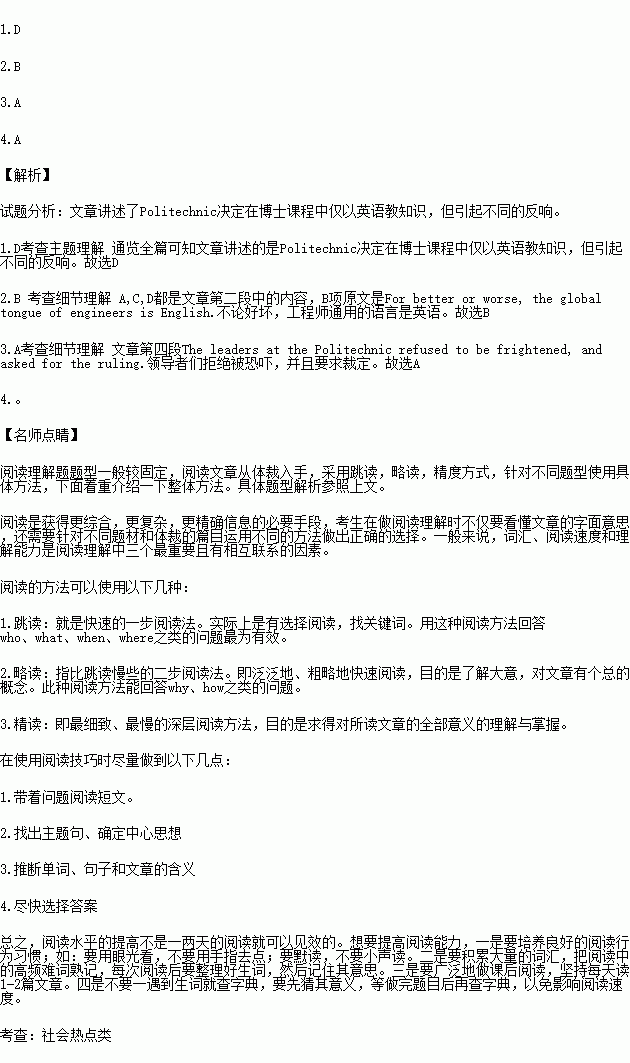题目内容
With around 40,000 students, the Politecnico di Milano is the largest and most technical university in Italy, offering undergraduate, graduate and other courses in engineering, architecture and design. Founded in 1863, just two years after Italy was united, Milan Polytechnic is international famous. Many of its graduates now work in big companies abroad like M.I.T., Caltech and Oxbridge.
Yet the Politechnic has a problem. As you know, here in Italy people speak Italian. Beautiful though the language may be, it is not a good choice for engineers when they’re building a way in Norway or designing a bridge in Vietnam. For better or worse, the global tongue of engineers is English. Hoping to attract more international students, the Politechnic decided to run its doctor’s courses in English only. Over 100 teachers went to court to block the plan, referring to a 1933 law that makes Italian the official language. For some teachers, all that matters is that they don’t feel comfortable teaching in English. In 2013, the court said they were right. Teaching English was out.
But there was more to come. They then went on a nationwide campaign against their university’s decision. Unwisely, the defenders of the Italian language backed them, saying, “we note with regret and concern the ignorance and abandonment(放弃) of Italian in the university education.”
The leaders at the Politechnic refused to be frightened, and asked for the ruling. Last month the Council of State said, “Art and science are free, and teaching them is free.” The question is whether teaching in English prevents students acquiring knowledge. But one could put it differently, and ask whether universities should be free to teach in whatever way they think best serves their students.
Interestingly, the people one might expect to be most against English-only teaching, the students themselves, have taken it easy. The president, Giovanni Azzone, told me: “Students write to me about everything from the lack of parking spaces to washrooms that don’t work. Not one has ever complained about the courses in English.”
1.The main idea of the passage is that the Politechnic decision to run its doctor’s courses in English only ________.
A. attracts more international students
B. sends more students to work abroad
C. makes some teachers out of work
D. meets with different responses
2.Which statement is NOT the reason why the Politechnic decided to use only English in class?
A. Many graduates work abroad.
B. Italian is widely used.
C. English is the global language.
D. The Politechnic is an international university.
3.Those who agree with the new change in the Politechnic are ________.
A. the Politechnic leaders B. over 100 teachers
C. the Council of State D. the defenders of Italian
4.The students’ attitude towards English-only teaching in doctor’s courses is _________.
A. indifferent(漠然的) B. disapproving
C. skeptical D. approving
 天天向上一本好卷系列答案
天天向上一本好卷系列答案 小学生10分钟应用题系列答案
小学生10分钟应用题系列答案Many people in the United States like eggs for breakfast. There are many different ways to cook eggs. One of the most common kinds of eggs for breakfast is scrambled eggs. In addition, this is one of the easiest dishes to cook. Read this recipe(秘法)for scrambled eggs and you will see how easy it is.
Scrambled Eggs | |
Utensils | Ingredients |
a frying pan a spatula(刮勺) 1 tea spoon a fork or spoon a small bowl | eggs 2 tablespoons of milk or butter salt pepper(胡椒) |
Steps:
1) Melt the butter in a frying pan over medium(适中的)heat.
2) In a small bowl, mix the eggs and the milk. Use the fork (or the spoon) to mix these well.
3) Pour this mixture into the pan.
4) Stir the eggs from time to time with the spatula. Continue until the eggs are no longer liquid.
5) Add salt and pepper. Add a little or a lot, as you like.
1.For this recipe, you do not need __________.
A. a knife B. a spatula C. a bowl D. a fork
2.Which of these steps comes first?
A. Stir the eggs with the spatula.
B. Eat the eggs for breakfast.
C. Add salt and pepper.
D. Mix the eggs and the milk.
3.Which of these words means “to change from solid to liquid”?
A. pour B. melt C. stir D. scramble

